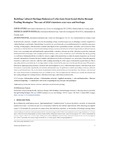Building Cultural Heritage Reference Collections from Social Media through Pooling Strategies: The Case of 2020’s Tensions Over Race and Heritage

Use this link to cite
http://hdl.handle.net/2183/28052Collections
- Investigación (FIC) [1679]
Metadata
Show full item recordTitle
Building Cultural Heritage Reference Collections from Social Media through Pooling Strategies: The Case of 2020’s Tensions Over Race and HeritageDate
2021Center/Dept./Entity
Information Retrieval Lab, Centro de Investigación TIC (CITIC)Abstract
[Abstract] Social networks constitute a valuable source for documenting heritage constitution processes or obtaining a real-time snapshot of a cultural heritage research topic. Many heritage researchers use social networks as a social thermometer to study these processes, creating, for this purpose, collections that constitute born-digital archives potentially reusable, searchable, and of interest to other researchers or citizens. However, retrieval and archiving techniques used in social networks within heritage studies are still semi-manual, being a time-consuming task and hindering the reproducibility, evaluation, and open-up of the collections created. By combining Information Retrieval strategies with emerging archival techniques, some of these weaknesses can be left behind. Specifically, pooling is a well-known Information Retrieval method to extract a sample of documents from an entire document set (posts in case of social network's information), obtaining the most complete and unbiased set of relevant documents on a given topic. Using this approach, researchers could create a reference collection while avoiding annotating the entire corpus of documents or posts retrieved. This is especially useful in social media due to the large number of topics treated by the same user or in the same thread or post. We present a platform for applying pooling strategies combined with expert judgment to create cultural heritage reference collections from social networks in a customisable, reproducible, documented, and shareable way. The platform is validated by building a reference collection from a social network about the recent attacks on patrimonial entities motivated by anti-racist protests. This reference collection and the results obtained from its preliminary study are available for use. This real application has allowed us to validate the platform and the pooling strategies for creating reference collections in heritage studies from social networks.
Keywords
Reference collections
Social networks
Pooling
Social networks
Pooling
Description
Preprint del artículo
Rights
© Parapar, Javier | ACM 2021. This is the author's version of the work. It is posted here for your personal use. Not for redistribution. The definitive Version of Record was published in Journal on Computing and Cultural Heritage (JOCCH)
ISSN
1556-4673





